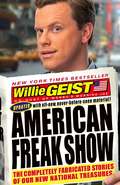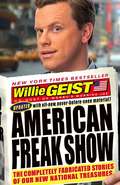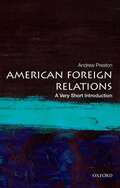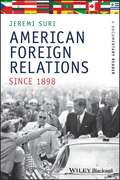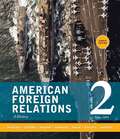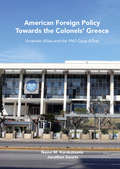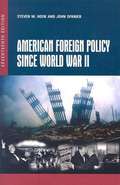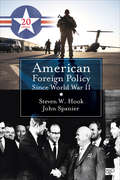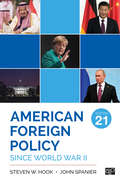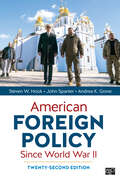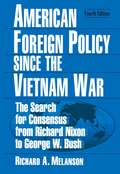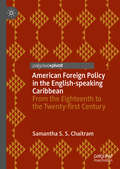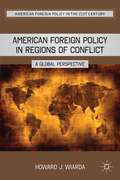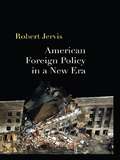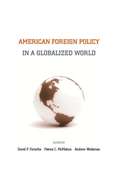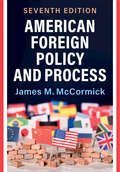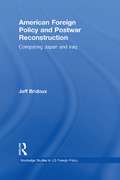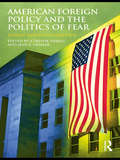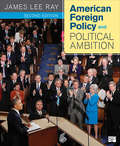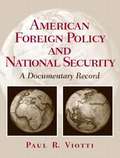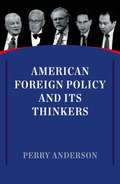- Table View
- List View
The American Freedoms Primer: A Citizen's Guidebook to the Most Celebrated Declarations of American Liberty
by Les AdamsThe American Freedoms Primer is a compilation of the most historically significant speeches and writings on liberty, from the seventeenth century to the present day. Many of the declarations contained in these pages have influenced and inspired legislation, shaping United States policies on human equality and civil rights. Several works by theorists and philosophers who drove the expansion of capitalism and democracy are included, such as John Locke, Edmund Burke, and Samuel Adams.Several of this nation's founding fathers contribute seminal works as well, including, but not limited to, George Washington, Thomas Jefferson, Benjamin Franklin, and James Madison. Abraham Lincoln's Inaugural Address, Emancipation Proclamation, and his Gettysburg Address are all in here, as are the works of other nineteenth century philosophical and legal geniuses, such as Daniel Webster, Frederick Douglass, and Theodore Roosevelt.Finally, of the great twentieth-century orators and writers on civil liberties, this book draws from Woodrow Wilson, Franklin Delano Roosevelt, John F. Kennedy, Lyndon B. Johnson, Martin Luther King, Jr, and several others.This pocket-sized book will inspire and educate.
American Freak Show
by Willie GeistThis is not the first book written about quantum mechanics, but it just might be the last. The theory presented inside these pages is so revolutionary that it has stunned the scientific community into reconsidering centuries of thought about the behavior of energy and matter. Prepare to have your mind blown. Sorry, that's the introduction to Willie Geist's next book--the culmination of his life's work. Look for it next spring, just in time for Mother's Day. This book is about his other passion: freaks. When he's not in the lab, Geist spends his time on MSNBC's Morning Joe sifting through the wreckage of American politics and popular culture. These days, that's a big job. With an Alaska hockey mom turning, almost overnight, into a national icon and threatening to move from Wasilla to the White House, with the world's most famous athlete now associated less with the Masters and more with the strippers, and with reality TV working around the clock to ensure the constitutional right of every man, woman, and child to fifteen minutes of fame, Geist's business is thriving. In his hilarious first book, American Freak Show, Geist takes the smart, biting observation loved by his television audience to new satirical extremes. The real-life characters who now haunt our daily lives are cast as stars in completely made-up scenes that, frankly, are not all that far from reality. Geist treats us to the first look at President Sarah Palin's unconventional inaugural address, performed live on WWE's Monday Night Raw after her renegade victory in the 2012 election. We go inside the ballroom for a Dean Martin-style welcome roast of Bernie Madoff upon his arrival in Hell, with Pol Pot serving as sidesplitting roastmaster. Geist provides us with never-before-seen FBI wiretap transcripts of the more mundane, but equally profane, telephone conversations of former Illinois governor Rod Blagojevich. And George W. Bush's batting-cage-and-waterslide-themed plans for a presidential library are laid out publicly for the first time. From Obama to Oprah, Afghanistan to Lohan, and Snooki to the Salahis, Willie Geist spares no one as our host of this wild American Freak Show. You'll laugh out loud while weeping for the future of America.
American Freak Show: The Completely Fabricated Stories of Our New National Treasures
by Willie GeistThis is not the first book written about quantum mechanics, but it just might be the last. The theory presented inside these pages is so revolutionary that it has stunned the scientific community into reconsidering centuries of thought about the behavior of energy and matter. Prepare to have your mind blown. Sorry, that's the introduction to Willie Geist's next book--the culmination of his life's work. Look for it next spring, just in time for Mother's Day. This book is about his other passion: freaks. When he's not in the lab, Geist spends his time on MSNBC's Morning Joe sifting through the wreckage of American politics and popular culture. These days, that's a big job. With an Alaska hockey mom turning, almost overnight, into a national icon and threatening to move from Wasilla to the White House, with the world's most famous athlete now associated less with the Masters and more with the strippers, and with reality TV working around the clock to ensure the constitutional right of every man, woman, and child to fifteen minutes of fame, Geist's business is thriving. In his hilarious first book, American Freak Show, Geist takes the smart, biting observation loved by his television audience to new satirical extremes. The real-life characters who now haunt our daily lives are cast as stars in completely made-up scenes that, frankly, are not all that far from reality. Geist treats us to the first look at President Sarah Palin's unconventional inaugural address, performed live on WWE's Monday Night Raw after her renegade victory in the 2012 election. We go inside the ballroom for a Dean Martin-style welcome roast of Bernie Madoff upon his arrival in Hell, with Pol Pot serving as sidesplitting roastmaster. Geist provides us with never-before-seen FBI wiretap transcripts of the more mundane, but equally profane, telephone conversations of former Illinois governor Rod Blagojevich. And George W. Bush's batting-cage-and-waterslide-themed plans for a presidential library are laid out publicly for the first time. From Obama to Oprah, Afghanistan to Lohan, and Snooki to the Salahis, Willie Geist spares no one as our host of this wild American Freak Show. You'll laugh out loud while weeping for the future of America.
American Foreign Relations: A Very Short Introduction (Very Short Introductions Ser.)
by Andrew PrestonFor better or worse--be it militarily, politically, economically, technologically, or culturally--Americans have had a profound role in shaping the wider world beyond them. The United States has been a savior to some, a curse to others, but either way such views are often based on a caricature of American actions and intentions. American Foreign Relations, then, is a subject of immense global importance that provokes strong emotions and much debate, but often based on deep misunderstanding. This Very Short Introduction analyzes the key episodes, themes, and individuals in the history of American foreign relations. While discussing diplomacy and the periods of war that have shaped national and international history, it also addresses such topics as industrialization, globalization, imperialism, and immigration. Covering the Revolution through the War on Terror, it examines the connections between domestic politics and foreign affairs, as well as the importance of ideals and values. Sharply written and highly readable, American Foreign Relations offers a clear-eyed narrative of America's role in the world and how it has evolved over time.
American Foreign Relations Since 1898 (Uncovering The Past: Documentary Readers In American History)
by Jeremi SuriThis volume brings together more than 50 documents which examine foreign policy not only in terms of leaders and states, but also through social movements, cultures, ideas, and images, to provide comprehensive understanding of how Americans have interacted with the wider world since 1898. <p><p> Draws together over 50 primary documents to give readers a first-hand account of the people and events that shaped the foreign policy of the United States <p> Incorporates documents relating not only to leaders and states, but also to social movements, cultures, ideas, and images <p> Highlights the diverse range of contributors to debates about American foreign policy, from presidents to protesters, students to singers <p> Includes a comprehensive introduction to the subject and headnotes for each document written by the editor, as well as a bibliography for further study
American Foreign Relations: Volume 2: Since 1895
by Thomas Paterson J. Garry Clifford Brigham Michael Donoqhue Kenneth HaganThis best-selling text presents the best synthesis of current scholarship available to emphasize the theme of expansionism and its manifestations.
American Foreign Policy Towards the Colonels' Greece: Uncertain Allies And The 1967 Coup D'état
by Jonathan Swarts Neovi M. KarakatsanisThis book seeks to comprehensively analyze and document U.S. foreign policy toward a strategic Cold War ally that posed a stark challenge to the traditionally-stated U.S. preference for democracy and political freedom. It details the complex ways in which the U.S. reacted to that challenge and went about crafting policies of longer-term accommodation with a regime it wished to retain as a close ally in a strategically important part of the world.
American Foreign Policy Since World War II (17th Edition)
by Steven W. Hook John SpanierThe United States remains engaged in an open-ended "war on terrorism" with no foreseeable endpoint.
American Foreign Policy Since World War II
by Steven W. Hook John W. SpanierSteven Hook and John Spanier’s classic text, American Foreign Policy Since World War II, celebrates its Twentieth Edition. It has remained the standard for guiding students through the complexities of American foreign policy by showing how recent developments confirm the book’s overarching theme—that there is an American “style” of foreign policy imbued with a distinct sense of national exceptionalism. Giving students important historical context, the book allows them to grasp the functions and frequent dysfunctions of the nation’s evolving foreign policy agenda. In this new edition, chapters covering the end of the Cold War have been combined and streamlined, making room for a new chapter that examines the aftershocks of the Arab Spring, political breakdowns in Iraq and Afghanistan, and the rise of the Islamic State. The final chapter considers the revival of power politics in world politics, with Russia and China stepping up their attempts to weaken the United States and create a multipolar world. The book ends by reconsidering America’s distinctive style of foreign policy and its resilience amid such turbulence since World War II.
American Foreign Policy Since World War II
by Steven W. Hook John W. SpanierSteven Hook and John Spanier’s classic text, American Foreign Policy Since World War II, celebrates its Twentieth Edition. It has remained the standard for guiding students through the complexities of American foreign policy by showing how recent developments confirm the book’s overarching theme—that there is an American “style” of foreign policy imbued with a distinct sense of national exceptionalism. Giving students important historical context, the book allows them to grasp the functions and frequent dysfunctions of the nation’s evolving foreign policy agenda. In this new edition, chapters covering the end of the Cold War have been combined and streamlined, making room for a new chapter that examines the aftershocks of the Arab Spring, political breakdowns in Iraq and Afghanistan, and the rise of the Islamic State. The final chapter considers the revival of power politics in world politics, with Russia and China stepping up their attempts to weaken the United States and create a multipolar world. The book ends by reconsidering America’s distinctive style of foreign policy and its resilience amid such turbulence since World War II.
American Foreign Policy Since World War II
by Steven W. Hook John W. SpanierThe Gold Standard for Textbooks on American Foreign Policy American Foreign Policy Since World War II provides you with an understanding of America’s current challenges by exploring its historical experience as the world’s predominant power since World War II. Through this process of historical reflection and insight, you become better equipped to place the current problems of the nation’s foreign policy agenda into modern policy context. With each new edition, authors Steven W. Hook and John Spanier find that new developments in foreign policy conform to their overarching theme—there is an American “style” of foreign policy imbued with a distinct sense of national exceptionalism. This Twenty-First Edition continues to explore America’s unique national style with chapters that address the aftershocks of the Arab Spring and the revival of power politics. Additionally, an entirely new chapter devoted to the current administration discusses the implications of a changing American policy under the Trump presidency.
American Foreign Policy Since World War II
by Steven W. Hook John W. SpanierThe Gold Standard for Textbooks on American Foreign Policy American Foreign Policy Since World War II provides you with an understanding of America’s current challenges by exploring its historical experience as the world’s predominant power since World War II. Through this process of historical reflection and insight, you become better equipped to place the current problems of the nation’s foreign policy agenda into modern policy context. With each new edition, authors Steven W. Hook and John Spanier find that new developments in foreign policy conform to their overarching theme—there is an American “style” of foreign policy imbued with a distinct sense of national exceptionalism. This Twenty-First Edition continues to explore America’s unique national style with chapters that address the aftershocks of the Arab Spring and the revival of power politics. Additionally, an entirely new chapter devoted to the current administration discusses the implications of a changing American policy under the Trump presidency.
American Foreign Policy Since World War II
by Steven W. Hook John W. Spanier Andrea K. GroveNow in its Twenty-Second Edition, Hook, Spanier, and Grove’s American Foreign Policy Since World War II has long set the standard in guiding students through the complexities of American foreign policy. The text introduces students to the American "style" of foreign policy, imbued with a distinct sense of national exceptionalism. By giving students the historical context they need, this book allows them to truly grasp the functions and dysfunctions of the nation’s foreign policy agenda with historical insight into modern policy context.
American Foreign Policy Since World War II
by Steven W. Hook John W. Spanier Andrea K. GroveNow in its Twenty-Second Edition, Hook, Spanier, and Grove’s American Foreign Policy Since World War II has long set the standard in guiding students through the complexities of American foreign policy. The text introduces students to the American "style" of foreign policy, imbued with a distinct sense of national exceptionalism. By giving students the historical context they need, this book allows them to truly grasp the functions and dysfunctions of the nation’s foreign policy agenda with historical insight into modern policy context.
American Foreign Policy Since the Vietnam War: The Search for Consensus from Nixon to Clinton
by Richard A MelansonThis book integrates the study of presidential politics and foreign policy-making from the Vietnam aftermath to the events following September 11 and the Iraqi War. Focusing on the relationship between presidents' foreign policy agendas and domestic politics, it offers compelling portraits of presidents Nixon, Carter, Reagan, Bush I, Clinton, and Bush II. In the course of comparing the efforts of these presidents to articulate a clear conception of the national interest and to forge a foreign policy consensus, the author shows the key role of public opinion in constraining presidential initiatives, in particular the decision to use military force overseas. Never more timely, this popular text is appropriate for courses in U.S. foreign policy, the presidency, or contemporary U.S. politics.
American Foreign Policy in the English-speaking Caribbean: From the Eighteenth to the Twenty-first Century
by Samantha S. ChaitramThis book traces American engagement in the English-speaking Caribbean from the eighteenth to the twenty-first century, and is the first to examine the policies of Presidents George W. Bush, Barack Obama and Donald Trump in this context. Focusing on The Bahamas, Jamaica, Trinidad and Tobago and Guyana as case studies, the book describes the growth of the English-speaking Caribbean and highlights American interest and foreign relations in this region from European discovery up through the post-9/11 era to today (1492-2019). The book demonstrates the unique relationship between America and the former British colonies, shedding light on U.S. foreign policy with the Caribbean in general and at a bilateral level with the four selected countries, providing a useful survey for students, scholars, diplomats, policymakers, governments officials, and anyone interested in gaining a better understanding of U.S. – Caribbean relations.
American Foreign Policy in Regions of Conflict
by Howard J. WiardaAmerica's regional foreign policy priorities are shifting, toward Asia, the Middle East, Latin America, and Africa, and away from Europe and Russia. Wiarda examines these changes and the reasons for them in each of these regional areas in this comprehensive work on global perspective on American foreign policy. Designed as a text for introductory international relations, foreign policy, comparative politics, and world politics courses, this book succeeds in integrating these often separate subfields and shows how the study of comparative politics can enlighten foreign policy.
American Foreign Policy in a New Era
by Robert JervisTo say that the world changed drastically on 9/11 has become a truism and even a cliché. But the incontestable fact is that a new era for both the world and US foreign policy began on that infamous day and the ramifications for international politics have been monumental.In this book, one of the leading thinkers in international relations, Robert Jervis, provides us with several snapshots of world politics over the past few years. Jervis brings his acute analysis of international politics to bear on several recent developments that have transformed international politics and American foreign policy including the War on Terrorism; the Bush Doctrine and its policies of preventive war and unilateral action; and the promotion of democracy in the Middle East (including the Iraq War) and around the world. Taken together, Jervis argues, these policies constitute a blueprint for American hegemony, if not American empire. All of these events and policies have taken place against a backdrop equally important, but less frequently discussed: the fact that most developed nations, states that have been bitter rivals, now constitute a "security community" within which war is unthinkable.American Foreign Policy in a New Era is a must read for anyone interested in understanding the policies and events that have shaped and are shaping US foreign policy in a rapidly changing and still very dangerous world.
American Foreign Policy in a Globalized World
by David P. Forsythe Andrew Wedeman Patrice C. MacMahonIn this volume, several leading foreign policy and international relations experts consider the long term prospects and implications of US foreign policy as it has been shaped and practiced during the presidency of George W. Bush. The essays in this collection - based on the research of well-respected scholars such as Ole Holsti, Loch Johnson, John Ruggie, Jack Donnelly, Robert Leiber, Karen Mingst, and Edward Luck - offer a clear assessment: while US resources are substantial, Washington's ability to shape outcomes in the world is challenged by its expansive foreign policy goals, its exceptionalist approach to international relations, serious questions about the limits of its hard power resources as well as fundamental changes in the global system. Illustrating one of the central ironies of the contemporary situation in foreign affairs and international relations: that at the very time of the ‘unipolar moment,’ the world has become globalized to such an extent that the unilateralism of the Bush Administration leads as much to resistance as it does to coercion, compliance, and cooperation. American Foreign Policy in a Globalized World will be of interest to students and scholars of politics and international relations.
American Foreign Policy and Postwar Reconstruction: Comparing Japan and Iraq (Routledge Studies in US Foreign Policy)
by Jeff BridouxOn the eve of the invasion of Iraq, President G.W. Bush argued that if setting up democracy in Japan and Germany after WW II was successful, then it should also be successful in Iraq. This book provides a detailed comparison of the reconstruction of Japan from 1945 to 1952 with the current reconstruction of Iraq, evaluating the key factors affecting the success or failure of such projects. The book seeks to understand why American officials believed that extensive social reengineering aiming at seeding democracy and economic development is replicable, through identifying factors explaining the outcome of U.S.-led post-conflict reconstruction projects. The analysis reveals that in addition to the effective use of material resources of power, the outcome of reconstruction projects depends on a variety of other intertwined factors, and Bridoux provides a new analytical framework relying on a Gramscian concept of power to develop a greater understanding of these factors, and the ultimate success or failure of these reconstruction projects. Appraising the effectiveness of American power in the contemporary international structure, this work is a significant contribution to the field and will be of great interest to all scholars of foreign policy, international relations and conflict studies.
American Foreign Policy and The Politics of Fear: Threat Inflation since 9/11 (Routledge Global Security Studies)
by A. Trevor Thrall Jane K. CramerThis edited volume addresses the issue of threat inflation in American foreign policy and domestic politics. The Bush administration's aggressive campaign to build public support for an invasion of Iraq reheated fears about the president's ability to manipulate the public, and many charged the administration with 'threat inflation', duping the news media and misleading the public into supporting the war under false pretences. Presenting the latest research, these essays seek to answer the question of why threat inflation occurs and when it will be successful. Simply defined, it is the effort by elites to create concern for a threat that goes beyond the scope and urgency that disinterested analysis would justify. More broadly, the process concerns how elites view threats, the political uses of threat inflation, the politics of threat framing among competing elites, and how the public interprets and perceives threats via the news media. The war with Iraq gets special attention in this volume, along with the 'War on Terror'. Although many believe that the Bush administration successfully inflated the Iraq threat, there is not a neat consensus about why this was successful. Through both theoretical contributions and case studies, this book showcases the four major explanations of threat inflation -- realism, domestic politics, psychology, and constructivism -- and makes them confront one another directly. The result is a richer appreciation of this important dynamic in US politics and foreign policy, present and future. This book will be of much interests to students of US foreign and national security policy, international security, strategic studies and IR in general. Trevor Thrall is Assistant Professor of Political Science and directs the Master of Public Policy program at the University of Michigan - Dearborn. Jane Kellett Cramer is an Assistant Professor of Political Science at the University of Oregon.
American Foreign Policy and Political Ambition
by James L. RayIn his eagerly-awaited second edition of American Foreign Policy and Political Ambition, James Ray revisits his deceptively simple premise that the highest priority of leaders is to stay in power. Looking at how political ambition and domestic pressures impact foreign policymaking is the key to understanding how and why foreign policy decisions are made. The text begins by using this analytic approach to look at the history of foreign policymaking and then examines how various parties inside and outside government influence decision making. In a unique third section, the book takes a regional approach, not only covering trends other books tend to miss, but giving students the opportunity to think comprehensively about how issues intersect around the globe—from human security and democratization, to globalization and pollution. Guided by input from adopters and reviewers, Ray has thoroughly re-organized the book and streamlined some coverage to better consolidate the historical, institutional, regional, and topical chapters and focus the thematic lens of the book. Ray has also brought the book fully up-to-date, addressing the latest events in American foreign policy, including the wars in Afghanistan and Iraq, the killing of Bin Laden, the WikiLeaks scandal and its aftermath, the impact of social media on foreign policy and world affairs, nuclear proliferation, developments in U.S.-Russian relations, climate change, and more.
American Foreign Policy and National Security: A Documentary Record
by Paul R. ViottiThis annotated and edited anthology brings together the documents most closely related to the making of American foreign and national security policy. It focuses on the Constitutional context; the organizational context; strategy, doctrine, and policy; arms control and disarmament; and multilateralism in terms of security, economy, and identity. The U. S. Constitution, Foreign Policy and National Security. Legislative-Executive Authority. The Constitutional Allocation of War Powers. Foreign Policy and National Security in the Executive Branch. Before World War II. World War II. The Cold War. Nuclear Weapons, Deterrence and Foreign Policy. Controlling Armaments. Spatial Limits: Geographic or Locational Approaches to Arms Control. Functional Approaches to Conflict and Arms Control. Global Organizations. Collective Security and Collective Defense. The Environment and the Economy. Human Rights. For anyone interested in American Foreign Policy, Defense Policy, Foreign Policy Making.
American Foreign Policy and Its Thinkers
by Perry AndersonMagisterial account of the ideas and the figures who have forged the American Empire.Since the birth of the nation, impulses of empire have been close to the heart of the United States. How these urges interact with the way the country understands itself, and the nature of the divergent interests at work in the unfolding of American foreign policy, is a subject much debated and still obscure. In a fresh look at the topic, Anderson charts the intertwined historical development of America's imperial reach and its role as the general guarantor of capital.The internal tensions that have arisen are traced from the closing stages of the Second World War through the Cold War to the War on Terror. Despite the defeat and elimination of the USSR, the planetary structures for warfare and surveillance have not been retracted but extended. Anderson ends with a survey of the repertoire of US grand strategy, as its leading thinkers--Brzezinski, Mead, Kagan, Fukuyama, Mandelbaum, Ikenberry, Art and others--grapple with the tasks and predicaments of the American imperium today.From the Hardcover edition.

